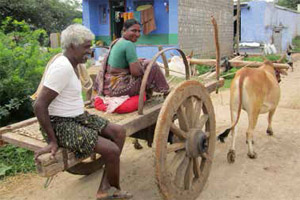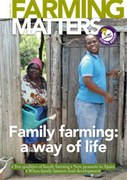The Agricultural Biodiversity Knowledge Programme (agrobiodiversity@knowledged) initiated by Oxfam Novib and Hivos aims to generate and share evidence and insights that will be of value for enhancing agricultural biodiversity. It aims to contribute to a change from mainstream high-input agricultural systems to biodiverse systems that serve farmers and nature; that ensure food and nutrition security; and that respect people and their knowledge and choices.

Small-scale family farmers in Andhra Pradesh constitute the vast majority of farmers in the state, and are facing a deep and protracted crisis. Over the past eighteen years, more than 35,000 farmers have committed suicide – many because of enormous debts due to high costs of cultivation with heavy a dependency on external inputs. Pests are an issue, all farmers agree on that. However, CSA realised that for many farmers, the main problem was not pests but their addiction to pesticides. Pesticides are expensive, are harmful to the health of farmers and their families, create ecological problems and, most importantly, do not solve the problem. The more pesticides you use, the more you disturb the ecosystem, and the worse the pest problem gets. Many family farmers in Andhra Pradesh have experienced this firsthand. It became clear that there was a pressing need for a solution to this problem. Farmers, NGOs and government jointly rolled out an effective strategy to widely spread the use of Non-Pesticidal Management (NPM)
Non-Pesticidal Management
A radical change was needed: the first step in stopping pests is to stop using pesticides and adopt integrated cropping systems and local resource-based practices. CSA works with family farmers, building on their knowledge, to make this change happen. NPM was developed during the early 1980s and has proven to be effective in different parts of the state. The basic philosophy behind NPM is to train farmers to better understand insect biology and behaviour and the crop ecosystem, building on their own knowledge and skills.
For family farmers, who live on their land and have a close relationship with all the crops they cultivate, NPM is a logical strategy. Their physical proximity to the land means that family farmers often have an intimate understanding of it and its workings. In addition farming families are well aware of the hazards posed by exposure to these chemicals which can immediately affect all family members, through the air, their skin and their food.
In 2004, CSA set up Farmer Field Schools (FFSs) in twelve villages in Andhra Pradesh to help farmers develop their knowledge about pest management. Through these FSSs. family farmers learnt to understand their agro-ecosystems and plan their crop cycles accordingly. Today the programme covers about 11,000 villages.
Andhra Pradesh used to have the highest pesticide consumption rate in India, but today it has one of the lowest. The villages that have given up chemical pesticides have not seen a pest outbreak in the last six years, and their yields have not decreased.
Different paths of scaling up
In development circles, one of the major questions that continuously arises is how to scale up best practices. The enormous change in attitudes towards pesticides in Andhra Pradesh provides a good illustration on how this can be done. By expanding, adapting or sustaining successful initiatives and the underlying philosophies, CSA has been able to reach many people in different places and over time. Instead of reinventing the wheel, we reuse the wheel and learn from the practice of inventing. Without this process, a number of valuable experiences would remain scattered as “islands of success”.
Success stories can be scaled up in different ways. They can spread spontaneously, or projects can be directly replicated by NGOs or government, or be propelled by grassroots movements spreading particular ideas and methods wider. In CSA’s experience, two successful strategies for scaling up took place: collaboration between NGOs and the government, and scaling up by farmers themselves, as they adopt the concept of NPM and adapt it to their local conditions.
From farmer to farmer
Punukula is a small tribal village in Andhra Pradesh’s Khammam district, which has acted as a beacon of hope for all the distressed farmers in the state. Punukula formally declared itself pesticide free in 2003. All of its farmers adopted alternative pest management strategies and became the navigators for a new development paradigm. They developed a simple and affordable method of preventing pests, based on understanding the pest’s life cycles, and have since become experts in disseminating this technology in their region. Their success was widely recorded in the media and convinced the state Minister of Agriculture to scale up the approach.
In this example, the state government became motivated to scale up alternative farming practices after observing that they were being successfully adopted by farmers. Yet it is also an example of a bottom-up scaling up strategy. The wide spread of NPM in the state can be attributed to horizontal expansion from farmer to farmer. As people live and work on the land, farmers readily share new knowledge within and between communities. They understand other farmers’ situations and can explain concepts and ideas in their own language. CSA enabled farmers to teach others in their communities and beyond. The small and labour-intensive scale of most operations, the closely knit social networks and the proximity to each others’ farms means that this method works well in family farming communities.
Women played a particularly important role in this process, contributing to rapid change in hundreds of villages. Women’s self-help groups were at the forefront of the grassroots movement that took charge of their farming, built their own capacities and found a way out of the agrarian distress they had been experiencing. In the programme supported by CSA, farming is seen as a livelihoods issue rather than as a mere technology issue. Women clearly understood the benefits of non-chemical farming, which brought them economic, social and health benefits. As more and more women’s groups heard about this programme they began to demand that it be initiated in their villages too, and convinced their men that chemicals are not needed for farming.
Rolling out NPM
The growing demand for NPM among farmers put substantial pressure on the state government to scale up such models. This eventually this led to the establishment of a scaling-up programme called “Community Managed Sustainable Agriculture”.
Often governments claim that farmers are not interested in shifting away from pesticide use. Yet the successful farmer-to-farmer spread of NPM in Andhra Pradesh provided hands-on experience about the feasibility of scaling up NPM. Family farmers are ready to change, whether or not the government is ready. Farmers take up NPM approaches when they see and experience the lasting benefits, even if such an approach is not supported by government extension programmes. Fortunately in the case of Andhra Pradesh, government departments were willing to support CSA’s approach.
The roll-out began with CSA piloting the programme with partner NGOs, after which the State Department for Rural Development helped to further replicate it. This collaboration showed that scaling up sustainable poverty eradication initiatives on such a large scale requires all the partners to be actively involved. The success of this collaboration depends on the actors sharing similar or complementary objectives: CSA’s goal to mainstream an alternative solution to pesticide use overlapped well with government’s aim to improve livelihoods through cost reduction in farming. Based on the lessons in Andhra Pradesh, the national level “Women Farmers Empowerment Programme” has been implemented in several states across the country.
Joint ownership with the government has given the programme the potential for becoming more than an island of success. The partnership with the state government has expanded the programme’s reach and has influenced policy at a state and national level. The state government has also benefitted from tapping into the expertise of NGOs, who act as innovators, developing and testing solutions, whereas governments are often tied to established procedures and often unwilling to take risks or adopt innovative approaches. One key issue here is that such collaboration requires trust and mutual acknowledgement between the partners involved, in order to dispel fears of being co-opted or one party having exclusive control.
Effective upscaling: the clue to sustainability
The sustainability of any farming practice or innovation might be judged based on the potential for scaling up of that practice. Many thousands of farmers have reported that ecological practices for managing pests, diseases and soil productivity are effective and successful. Equally there is a wealth of evidence about how this model is economically viable and increases farmers’ self confidence. Reportedly, farmers who had mortgaged their lands to meet their debts are now able to reclaim ownership over their land. Out-migration has reduced and farming is once again a dignified occupation. Finally, women farmers have proven again that when they are in the driver’s seat, their development approaches are more eco-sensitive, equitable, sustainable and have a longer term perspective.
Author
Zakir Hussain is Programme Manager at the Centre for Sustainable Agriculture (CSA) in Tarnaka, Andhra Pradesh, India (e-mail: zakir@csa-india.org). G.V. Ramanjaneyulu is the Executive Director at CSA (e-mail: ramoo@csa-india.org). G. Rajasekhar is leading the seeds initiative at CSA (e-mail: rajasekhar@csa-india.org). G. Chandra Shekar is Head of Knowledge Management at CSA (e-mail: sekhar@csa-india.org

